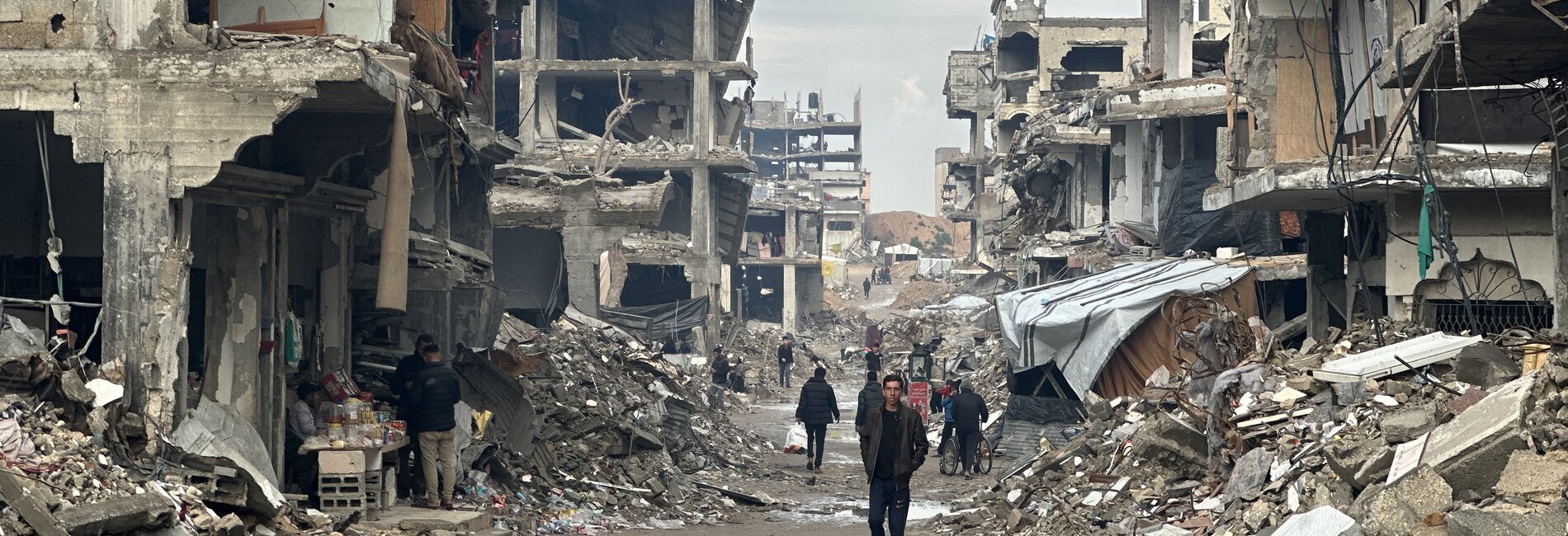"When Gaza burned, children starved, hospitals collapsed – did you act?"
Briefing by Olga Cherevko, OCHA Spokesperson in Gaza, to journalists in UN Headquarters in New York
Deir al Balah
[As prepared for delivery]
In an instant, this Tuesday, Gaza city was handed a death sentence - leave or be killed. Hundreds of thousands of battered, exhausted and terrified civilians were ordered to flee to an area already so overcrowded that even small animals must search for spaces to squeeze between to move around. Where hospitals house patients in the halls and balconies, as clean water, nutritious food and life are no longer basic rights, but commodities so rare, that most only dream of having them one day. If they survive the bombings, that is.
To the west - the Israeli warship-framed sea, whose ominous waves swallow tattered tents when tides rise. To the east, north and south - ground forces and tanks are tightening the torque on the disappearing space as drones and fighter jets circle above. Their deafening sound is permanently seared in one’s memory – a warning that no place is safe.
One dear friend texted me yesterday, “I tried to find space in the south, but there is none.” His 8-year-old cousin was killed instantly in an Israeli strike with several other children last week while waiting for bread to finish baking. His daughter has just turned two - and has known nothing but war in her tiny life. When a bomb falls nearby, she ducks under a table in her dad’s community kitchen where he continues to feed thousands daily, bringing sustenance and hope to those who have lost everything. Gaza doesn’t need pity. Gaza needs an end to this appalling violence.
The unmistakable smell of death is everywhere – a grizzly reminder that the ruins lining the streets hide the remains of mothers, fathers, children. Humans who once laughed, cried, dreamed. Their lives cut short by the war’s killing machines, many to never be found again.
On our way back into Gaza yesterday, we drove down barely passable roads, as people crowded around our convoy, visibly distraught, pleading for this horror to end. A small girl, walking alongside her father, waved as we passed. Will she survive this hell? Do world leaders who can stop this war see her as worthy of peace? Her life is in the hands of those who choose to act.
Dignity and hope have been stripped away, with every killing of a loved one, every strike on a civilian lifeline, every denial of access. Systems that support life have been systematically dismantled and destroyed. Parents struggle to shield their children from violence, from hunger, from fear. Fleeing families flood the street, clutching their children in their arms, not knowing where they will go as every option appears to have been exhausted. The race against time, against death, against the spread of famine, feels like we as humanitarians are running through quicksand. Even more so as humanitarian convoys are too often denied, delayed or obstructed by the Israeli authorities.
Yet, even in such hardship, humanity shines. Palestinian doctors, nurses and paramedics working around the clock, often without pay, medicine or electricity. Aid workers, from UN agencies, the Red Crescent, local and international NGOs, delivering food, medicine and clean water under fire. Ordinary people sharing the little they have with strangers. In every act of care – a refusal to let cruelty define the future. Proof that even in the darkest times, the human spirit endures.
I'm often asked if I have any hope left. Hope may be all we have left, so we must nurture it. Because the silence of fatigue must not drown out the voices of those enduring this nightmare. Their stories of loss, resilience and yes, of eternal hope, must be told. And when a Palestinian girl puts her hands in the shape of a heart when we meet, or a mother lets me hold her precious baby, or a grandfather tells me our work here matters, I know that hope springs eternal.
But hope alone will not keep people alive. Urgent decisions are needed that must pave the way to a lasting peace before it’s too late. Voices that can silence the bombs. Actions that will stop the bloodshed. An immediate and sustained ceasefire. An immediate and unconditional release of all hostages, who have endured horrific suffering, as well as all those arbitrarily detained. Protection of all civilians, wherever they are in Gaza. Unfettered humanitarian access, including to the north, with aid flowing through all crossings, and via all corridors. Accountability: laws of war are not optional, and their violations must be investigated and addressed, for the sake of justice and to prevent setting a dangerous precedent.
The people of Gaza are not asking for charity. They are asking for their right to live in safety, in dignity, in peace. And our humanity - yours, mine, all of ours – demands that we act now.
History will judge us not by the speeches we make, but by our actions. When Gaza burned, children starved, hospitals collapsed – did you act?
Today, and every day, is a new chance for the international community to match words with action. Don’t miss it as it might be the last.
Thank you.










